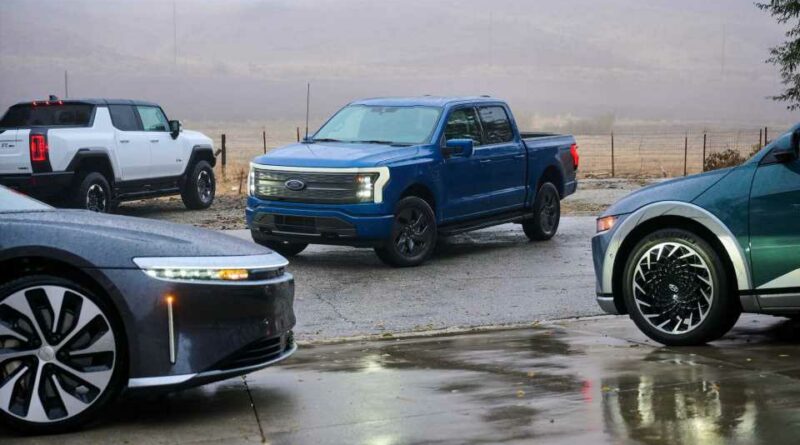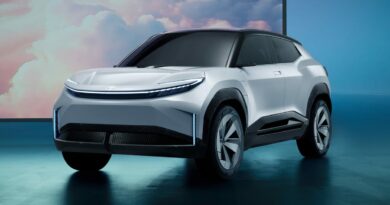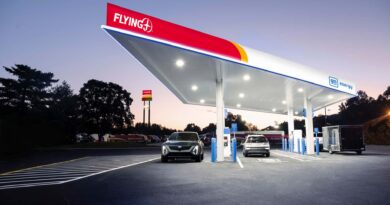The Market Share For New Non-Tesla EVs Skyrocketed 800% In Just 3 Years: Study
For better or worse, car dealers in the United States are getting into the electric car business, according to a recent study from iSeeCars, which is a website that aggregates all listings of used cars for sale.
So much so, that the market share for new non-Tesla EVs in the U.S. has grown by more than 800% in the last three years, while the number of non-Tesla new car dealers selling EVs Stateside has increased from 16.5% to 55.1% between November 2020 and November 2023.
That’s solid growth any way you look at it, and it’s a sign that dealers–some of which have been reluctant to sell EVs–are adapting to the times.
Get Fully Charged
More car dealers selling EVs other than Teslas means more choice for consumers
While Tesla is still the king when it comes to sheer sales volume, thanks in part to its well-established online presence, other brands have struggled to keep up. Traditional car dealers left the impression that they were reluctant to bring EVs on their lots, but this report shows that more and more dealers are embracing electric vehicles, which means prospective buyers have more and more models to choose from.
Used car dealers are also getting into the EV game, with 29.4% of them having battery-powered cars on their lots in November 2023, a sharp increase from 17.1% three years ago.
EV Market Share Growth
| Month | New EV Market Share (excluding Tesla) | 1- to 5-Year Old Used EV Market Share (including Tesla but excluding Tesla stores) |
| Nov. 2020 | 0.5% | 0.6% |
| Nov. 2021 | 1% | 0.7% |
| Nov. 2022 | 2.3% | 1.1% |
| Nov. 2023 | 4.7% | 1.9% |
The increasing number of new electric models available for sale in the U.S. has been one of the catalysts for the growing number of EV-loving dealerships. While most car brands didn’t have a single electric model in their range, now the situation is quite different. General Motors, the Volkswagen Group, BMW, and other automotive giants have stepped up their electrification efforts and are offering more EVs than ever before.
“New car dealers–outside the Tesla network–offering electric vehicles have ramped up over the past three years, with the biggest growth occurring in just the past 12 months,” said Karl Brauer, iSeeCars executive analyst. “This is going to put increasing pressure on Tesla’s sales and market share. Used car dealers have also stepped into the EV market, with more than 70 percent growth compared to three years ago.”
The small states of Delaware, Rhode Island, and Hawaii have led the way for dealers nationwide when it comes to EV adoption. In November 2023, 81.1% of new car dealers in Delaware were selling EVs, while Rhode Island had 75% and Hawaii was 71.4%.
At the other end of the spectrum are more rural states that have historically had a lower EV adoption rate. At the bottom of the list is Montana with 23.1% of new car dealers selling electric cars. Above it is Wyoming with 35% and Mississippi with 38.2%.
Although Mississippi is toward the bottom of the list, it’s also one of the states with the highest growth in new car dealers selling EVs. Compared to 2020, when just 6.3% of new car dealers sold EVs, now there are six times as many dealers that have electric cars on their lots.
States With the Highest Growth in New Car Dealers Selling EVs (excluding Tesla Stores): November 2020 vs. 2023
| Rank | State | Improvement | Percentage of New Car Dealers Selling EVs, 2023 | Percentage of New Car Dealers Selling EVs, 2020 |
| 1 | Idaho | – | 40.7% | 0% |
| 2 | Montana | – | 23.1% | 0% |
| 3 | West Virginia | 16.8x | 50% | 3% |
| 4 | Oklahoma | 11.1x | 45.8% | 4.1% |
| 5 | Arkansas | 8.3x | 42.5% | 4.1% |
| 6 | South Carolina | 8x | 59.7% | 7.5% |
| 7 | Mississippi | 6.1x | 38.2% | 6.3% |
| 8 | Louisiana | 6x | 39% | 6.5% |
| 9 | Kansas | 5.8x | 56.5% | 9.7% |
| 10 | Minnesota | 5.4x | 54.1% | 10% |
To come up with this data, iSeeCars looked at the inventories of over 82,000 new and used car dealers in the United States from November 2020 to November 2023 on a month-by-month basis. Low-volume dealers, as well as new and used cars sold directly by Tesla, were excluded.
Source: Read Full Article




